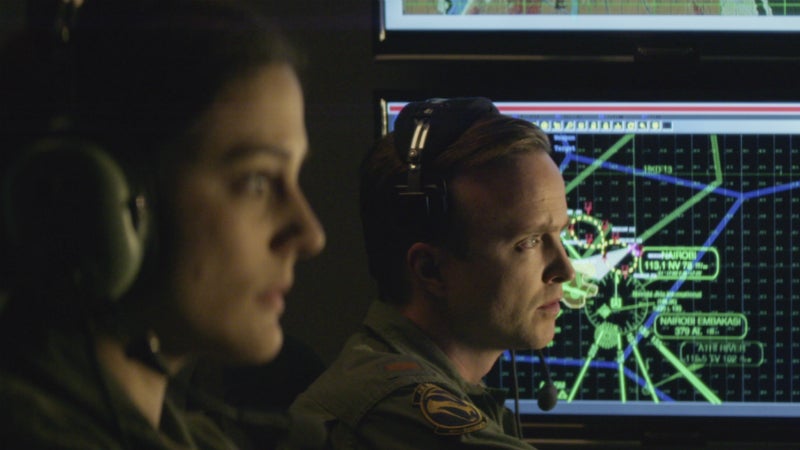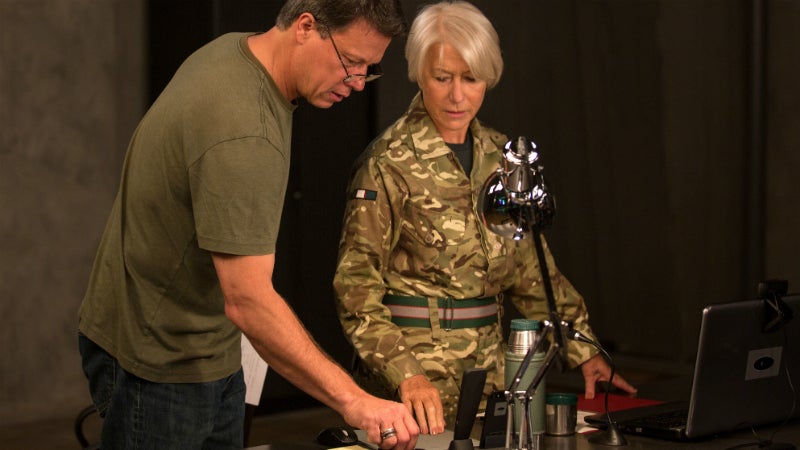
Military drones can kill enemies from miles above in the sky—but they can also kill innocent civilians. The people controlling these weapons are often continents away, and a new movie shows us the agonizing decisions that these people face.
Eye in the Sky, which hits select theaters today, spotlights drone pilots—and their second-by-second morality decisions that not only they face, but that everyone involved in twenty-first century warfare faces, now that we have drones that require rapidfire tactics brewed up by countless people across the globe, in concert, in a matter of minutes: Prime ministers. Presidents. Colonels in control rooms on several continents. On-the-ground spies.
And there are humans in the crosshairs of these drones: terrorists and civilians alike, including kids. This movie is great, but it’s also exhausting. It becomes painfully clear: being a drone pilot is one of the most grueling and taxing jobs of the twenty-first century.

Being a drone pilot is extremely high pressure
Eye in the Sky touches on a lot of that. There are two young drone pilots: Steve Watts (Aaron Paul) and Carrie Gershon (Phoebe Fox). She’s a newb on her first mission, and he’s a guy just looking to pay off his student loans. They show up at the base in Las Vegas, put on their uniforms, and sit in a dark trailer filled with glowing monitors and panels for hours on end.
Imagine you’re in their shoes. Sleep all night, work all day, on standby. Then, it happens. Your supervising officer gives you the word: Fire. You’re about to pull the trigger, and drop a bomb on a village of civilians—but it’s to take out terrorists who would otherwise kill even more people. Right? Does that make it okay? Could you pull the trigger?
“What is the impact of a Hellfire missile? You may think it’s like a sniper bullet—but it throws brick and mortar around,” director Gavin Hood told me over the phone. Stakes are higher. More lives are at risk. Innocent ones.
In the movie, military officer Katherine Powell (Helen Mirren) oversees a multinational intel operation that’s sniffed out a band of Shabab terrorists hiding out in a nondescript house in a village in Nairobi. She eventually learns that they plan to strap on a bomb-lined vest and pull off a suicide attack. And she decides to use a Hellfire drone to take them out.

Problem is, this criminal safehouse is smack in the middle of village brimming with families, bystanders, and children—including one girl who’s selling bread on the street, just outside the hideout. As the Hellfire hovers high above, unbeknownst to all on the ground, controlled by that pair of pilots in Vegas. Most of the film dives into the moral and political dilemmas of using UAVs in warfare, in all levels of the command chain.
In what is Alan Rickman’s final live-action role, he plays Lt. Gen. Frank Benso, Powell’s boss who sits in an office with some of Britain’s most high-ranking government officials. The most fascinating part of the movie, for me, was seeing the group’s kaleidoscope of opinions; each person passionately makes their case for either shooting or not shooting the Hellfire missile. It creates a domino effect: More leaders are pulled in, more views are challenged.
As they’re doing this, the Shabab group is having a meeting in the safehouse back in Kenya, strapping on bombs and ready to head out to commit mass murder in a matter of minutes. And that little girl selling bread to make money for her family outside is going nowhere.
“Guy [Hibbert, screenwriter] was really presenting me with different perspectives of this event,” Hood says. “Depending on which character I attach myself to, I might respond very differently.” The crew had a full-time drone pilot consultant on call, plus a British military intel consultant, lawyers, and colonels in the U.S. military and intelligence divisions.
You’ll leave the theater having the same debate Benso, Powell, and Watts had in the movie—should we be using drones in warfare? Not only is the cost of human life a factor, but what of the propaganda war—what geopolitical ripples will a Hellfire blast send through the region? And what about the drone pilot sitting in the dank trailer in the desert, whose finger unleashes a rain of destruction on an entire town? Would you be able to live with yourself? Hood says those unclear answers are the whole point of the movie.
“I’m okay if the audience struggles with that,” he says.